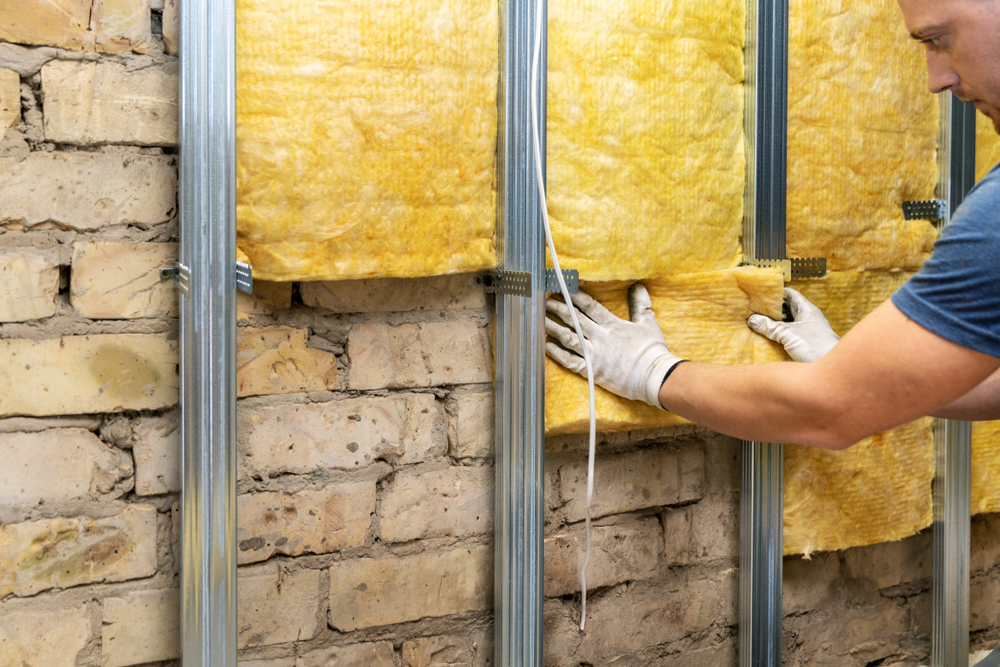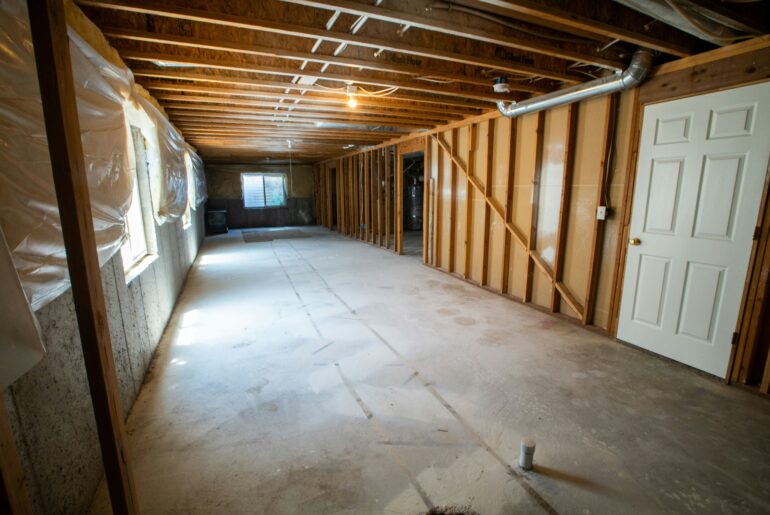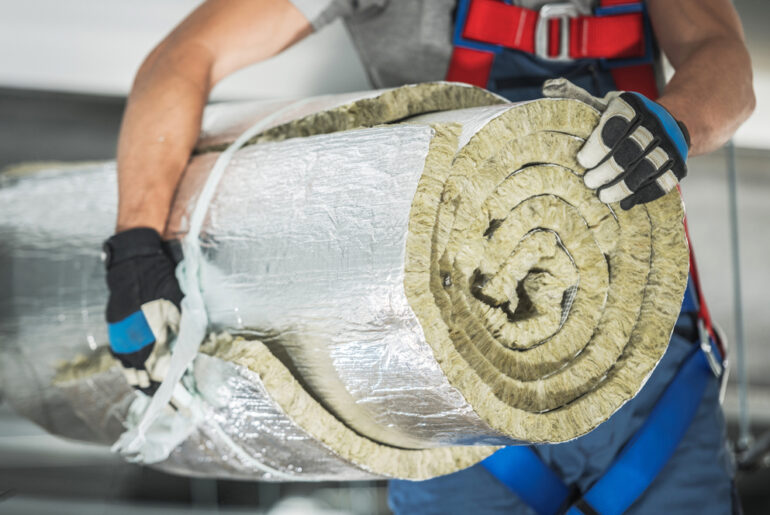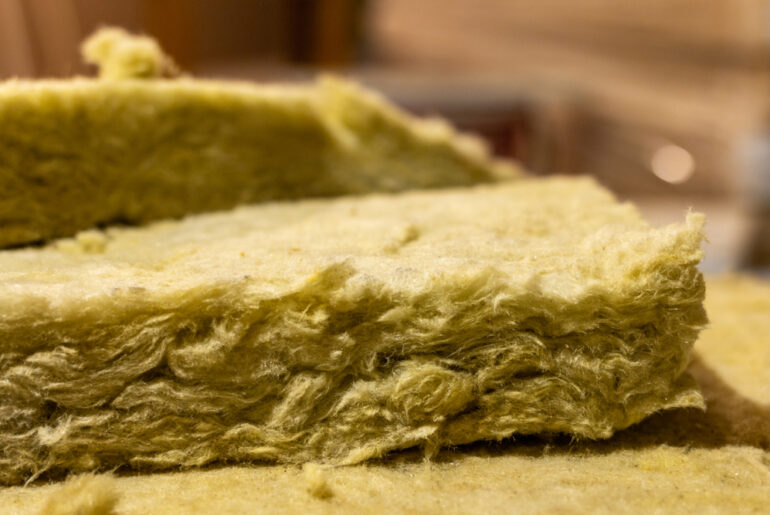Insulating your basement reduces heat loss, saves energy costs, and provides optimal energy efficiency in your home. It also prevents the growth of mold, which are known allergens, thereby improving the quality of health.
Therefore, it is essential to prioritize basement insulation because of its many financial and health benefits. In fact, no area of the house should be left uninsulated except your home is specially constructed for energy efficiency.
Is basement insulation worth the price tag? What are its benefits? And how much do you have to budget to get it done? You’ll find the answer to these and more in this article. But before we get into costs and the possible breakdown of the finances of insulation, let’s start with why you should insulate your basement.
Reasons To Insulate Your Basement
1. Conserve Energy
Insulating your basement helps you save more energy than usual, as they help reduce heat exchange. A well-insulated basement traps air within your home’s confinement, allowing the internal temperature to stay constant for long.
2. Reduce Health Risks
Molds can grow on virtually anything, and your basement is no exception as long as there is enough moisture and oxygen to support their growth.
Insulating with mold-resistant materials such as fiberglass helps prevent mold and spore growth in your basement. The benefit of this includes lesser exposure to allergens that can predispose to asthma in susceptible individuals.
3. Save Money
You get to save more money since you no longer need to buy more energy units to cool your home during summer or heat it during winter. You can save up to 20 percent on your annual energy consumption, depending on how much energy you consume.
Overall, you get more than 100 percent ROI on insulation, as you save more on heating and cooling costs.
How Much Does it Cost to Insulate a Basement?
The average cost of insulating your basement is dependent on several factors, which include:
- The location of your home
- Average basement or land area
- Type of insulation desired
Prices are location-dependent and can vary from state to state. Insulation costs in developed areas are likely to cost more than in the countryside. In addition, the size of your basement matters as insulating fees are charged per square foot. Hence, the larger your basement size, the higher the costs. Finally, the type of insulation material also significantly affects the total cost.
Overall, it can cost between $4000 to $8000 to fully install spray foam insulation, $930 to $2500 to install blown-in basement insulation, and $300 to $1000 to install a fiber batt basement insulation. Also, the cost to install radiant basement insulation is approximately $750 to $2500 and $2500 to $7000 to install a rigid foam basement insulation.
The approximate cost range may or may not include additional charges such as delivery fees and extra charges for removing or relocating any HVAC, plumbing, and electrical installations that may hinder the insulation procedure.
What Insulation To Use For Insulating Basement?
The most popular basement insulation materials are spray foam, blown-in fiberglass, batt fiberglass, and rigid foam. Each insulation material offers unique benefits and also has its corresponding disadvantages.
Spray Foam Insulation
Spray foam is one of the most expensive insulation materials, and they are often applied directly to the basement floors, edges, and cracks. It forms a tight building envelope that is impervious to leaks. The foam is made from a mixture of unique chemical components designed to react quickly by expanding on contact with the floor.
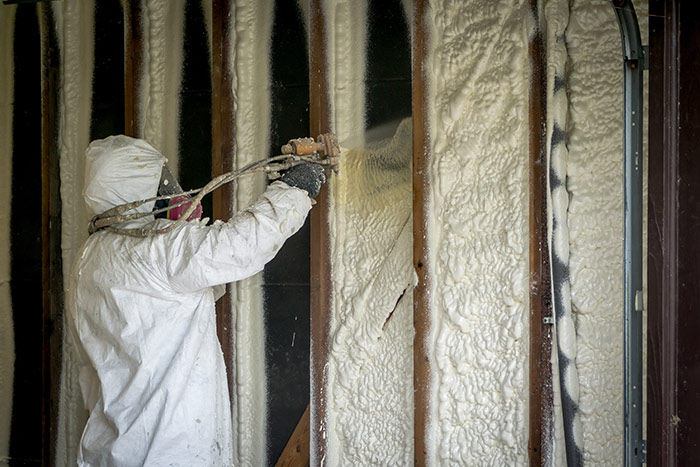
Insulating the basement with spray foam usually takes about four to six hours. Spray foam insulation does not retain water or moisture, limiting the growth of mold and mildew. It also offers excellent soundproof quality and dampens unnecessary sound from getting into the rest of your home.
Fiberglass
Fiberglass insulation is made from plastic materials that have been mechanically mixed and processed with finely grounded glass fibers. They are one of the oldest forms of insulating materials and can be found in the walls, attic, and crawl space of old houses. Fiberglass is cheaper to install compared to other insulating materials and can be installed correctly without the help of professionals.
However, basements with fiberglass insulation are prone to mold growth as the fiberglass batts are permeable to moisture, a vital growth medium for molds. Also, it does not stop warm, humid interior air from contacting the wood studs in the basement and can worsen condensation issues.
Rigid Foam
Rigid foam insulation consists of a rigid panel of thick foam made from either polystyrene, polyisocyanurate, or polyurethane. The materials are water-resistant, which helps limit mold growth. The foam material can create an effective air barrier that blocks moisture if installed correctly. They also last longer than fiberglass and other boards and do not need to be replaced regularly.
Despite the benefits rigid foam insulation offers, they are prone to air leakages if installed poorly.
Should You Insulate Basement Walls?
It is essential to insulate basement walls alongside the floors as it offers optimal insulating protection and prevents air and moisture escape. Insulating the wall complements the insulation work done on the floor.
Rigid foam board, spray foam, and fiberglass are some of the best insulating materials for basement walls. In addition, always ensure that all unfinished basement wall projects are completed as fast as possible to avoid health-related issues that can arise from contact with chemical components from insulating material. Exposure to this chemical can lead to allergies and skin irritation. A finished project guarantees a safe and protected home.
What’s The Cheapest Way To Insulate Basement Walls
It’s best to use the same insulating materials as the basement floor; however, if there is a need to manage cost, you can also use rigid foam insulation, fiberglass, or any other cost-effective insulation type.
Should You Insulate Basement Walls Below Grade
It is not advised to use below-grade insulating materials when insulating your basements as it may cause further damage as it degrades. At best, leave the walls until you gather enough resources.
Do Concrete Basement Walls Need Insulation?
Like the floors, concrete basements also need insulation.
Should You Insulate Basement Ceiling?
While it might seem like a waste of time, energy, resources, and money, certain situations require you to insulate your ceiling. These include creating a sound barrier between the upper and lower rooms to increase privacy or prevent the degradation of soft insulating materials like fiberglass.
Other than that, there is no need to do so as it’s not worth the stress. Rigid board foams and spray foams are the best and most efficient materials for homeowners intending to insulate their basement ceiling.
Should I Insulate My Basement Ceiling Of The Basement Is Unheated?
If you intend to use the basement as the main room, it is advised to insulate the ceilings since the entire room is unheated. All-Round insulation can provide enough warmth, and heating equipment might not be needed at certain times.
Should You Insulate the Basement Floor?
Of course, insulating the basement floor is mandatory as it helps seal leaks and cracks that contribute to air loss. Every homeowner should ensure their basement floors are properly sealed with suitable insulating material as they stand to benefit from a higher level of comfort, heat loss, and moisture prevention.
Unfinished Basement Insulation
Many homeowners have unfinished basement projects that may have been left behind for reasons best known to them. Incomplete basement insulation creates an uninviting look, increases your chances of developing issues, and can expose you to health issues.
Exposed insulation is hazardous to your health and can quickly escalate to irritated skin when you come in contact with insulating chemicals like spray foam. Respiratory issues can also be another side reaction from inhaling chemicals or insulating residues. Also, unfinished residue increases the fire risk as these materials are easily flammable. Ensure you complete any unfinished insulation project in your basement to reduce these possible risks.
Insulating Basement Walls
When insulating your basement walls, use either rigid board or spray foam insulating materials, as they have been proven to be the best and most effective. Polyisocyanurate, expanded polystyrene (EPS), or extruded polystyrene (XPS) perform excellently for interior basement insulation.
However, professionals now avoid using polystyrene (XPS) as it contains certain chemicals that contribute significantly to global warming. Homeowners should strive to use eco-friendly insulating materials in their basement.
Insulating Basement Ceiling
Insulating the basement ceiling is often considered an optional project, especially for homeowners on a budget. But you can save up to 45 percent on energy costs by insulating the ceiling.
Ensure to properly clear any wires or note plumbing and installation tracks to help you map out where the installer should cover. The wall joist should be looked at, and weaker ones should be removed immediately before laying begins. Lastly, consider the state of your ceiling and choose the right material, such as spray foam, if you want long-lasting quality.
Insulating Basement Floor
Insulating your basement floors is necessary, unlike the ceilings, as it keeps your feet warm, moderates the room’s temperature, and increases energy efficiency. Look for signs of moisture or water damage, including mold growth, dampness, or damaged water pipeline, before laying the rigid boards or spraying the foams.
Once they have been tackled, install a sub-floor to make room for the insulation and consider adding an in-floor heating system as the heat rises from the basement to the surrounding rooms, decreasing energy bills.

